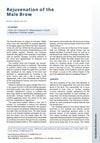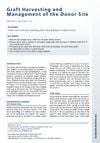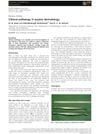 1 citations,
January 2021 in “Our Dermatology Online”
1 citations,
January 2021 in “Our Dermatology Online” A scalp infection can look like alopecia areata and get worse if treated incorrectly.
 November 2024 in “Clinical Cosmetic and Investigational Dermatology”
November 2024 in “Clinical Cosmetic and Investigational Dermatology” Rosemary oil may effectively treat hair loss with fewer side effects, but more research is needed.
 March 2024 in “Indian Journal of Dermatology/Indian journal of dermatology”
March 2024 in “Indian Journal of Dermatology/Indian journal of dermatology” Using animal names for skin conditions helps with learning and memory.
November 2023 in “Plants” Compounds from Jatropha cordata bark have significant anti-inflammatory effects and could help with hair loss.
 August 2023 in “International Medical Case Reports Journal”
August 2023 in “International Medical Case Reports Journal” Acne necrotica can be effectively treated with topical cream and antibiotics.
 July 2023 in “Journal of Clinical Medicine”
July 2023 in “Journal of Clinical Medicine” The document concludes that understanding hair follicle histology and the hair cycle is crucial for diagnosing alopecia.

New treatments for hair loss should target eight main causes and use specific plant compounds and peptides for better results.
 March 2023 in “Journal of skin and stem cell”
March 2023 in “Journal of skin and stem cell” Trichoscopy is a good, quick, non-invasive way to diagnose different types of hair loss.
January 2023 in “Springer eBooks”  12 citations,
July 2008 in “Facial Plastic Surgery Clinics of North America”
12 citations,
July 2008 in “Facial Plastic Surgery Clinics of North America” The document concludes that careful planning and consideration of male brow anatomy are essential for successful facial rejuvenation with cosmetic surgery.
 2 citations,
August 2013 in “Facial Plastic Surgery Clinics of North America”
2 citations,
August 2013 in “Facial Plastic Surgery Clinics of North America” The conclusion is that careful planning and technique in hair transplant surgery are crucial for successful graft harvesting and minimizing scars, with proper aftercare to avoid complications.
 32 citations,
July 2011 in “Facial Plastic Surgery”
32 citations,
July 2011 in “Facial Plastic Surgery” New hair transplant methods offer more natural results and better graft survival, with ongoing research to increase donor hair options.
 6 citations,
July 1990 in “The Journal of Pediatrics”
6 citations,
July 1990 in “The Journal of Pediatrics” A boy with toxic shock syndrome had severe heart rhythm problems but recovered with treatment.
 1 citations,
June 2016 in “Equine Veterinary Education”
1 citations,
June 2016 in “Equine Veterinary Education” The document concludes that using the right diagnostic methods and careful sample handling is crucial for accurately diagnosing horse skin diseases.
 February 2006 in “Journal of The American Academy of Dermatology”
February 2006 in “Journal of The American Academy of Dermatology” Most patients with anal Pemphigus Vulgaris had repeated episodes but fully recovered with treatment, without long-term problems.
 February 2007 in “Journal of The American Academy of Dermatology”
February 2007 in “Journal of The American Academy of Dermatology” Hair tonic helps stop hair loss in most users.
 January 2013 in “Hair transplant forum international”
January 2013 in “Hair transplant forum international” Both surgical hairline advancement and follicular unit transplantation effectively lower the female hairline, but they differ in speed, scarring, and naturalness of results.















